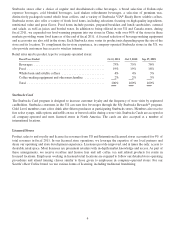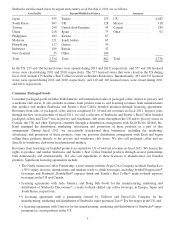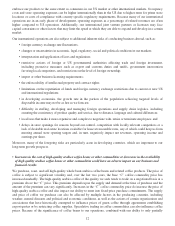Starbucks 2011 Annual Report Download - page 20
Download and view the complete annual report
Please find page 20 of the 2011 Starbucks annual report below. You can navigate through the pages in the report by either clicking on the pages listed below, or by using the keyword search tool below to find specific information within the annual report.•The loss of key personnel or difficulties recruiting and retaining qualified personnel could adversely impact our
business and financial results.
Much of our future success depends on the continued availability and service of senior management personnel. The
loss of any of our executive officers or other key senior management personnel could harm our business. We must
continue to recruit, retain and motivate management and other employees sufficient both to maintain our current
business and to execute our strategic initiatives, some of which involve ongoing expansion in business channels
outside of our traditional company-operated store model. Our success also depends substantially on the contributions
and abilities of our retail store employees who we rely on to give customers a superior in-store experience.
Accordingly, our performance depends on our ability to recruit and retain high quality employees to work in and
manage our stores. If we are unable to recruit, retain and motivate employees sufficient to maintain our current
business and support our projected growth, our business and financial performance may be adversely affected.
•Adverse public or medical opinions about the health effects of consuming our products, as well as reports of
incidents involving food-borne illnesses, food tampering or food contamination, whether or not accurate, could
harm our business.
Some of our products contain caffeine, dairy products, sugar and other active compounds, the health effects of which
are the subject of public scrutiny, including the suggestion that excessive consumption of caffeine, dairy products,
sugar and other active compounds can lead to a variety of adverse health effects. Particularly in the US, there is
increasing consumer awareness of health risks, including obesity, due in part to increased publicity and attention
from health organizations, as well as increased consumer litigation based on alleged adverse health impacts of
consumption of various food products. While we have a variety of beverage and food items, including items that are
coffee-free and have reduced calories, an unfavorable report on the health effects of caffeine or other compounds
present in our products, or negative publicity or litigation arising from certain health risks could significantly reduce
the demand for our beverages and food products.
Similarly, instances or reports, whether true or not, of unclean water supply, food-borne illnesses, food tampering
and food contamination, either during manufacturing, packaging or preparation, have in the past severely injured the
reputations of companies in the food processing, grocery and quick-service restaurant sectors and could affect us as
well. Any report linking us to the use of unclean water, food-borne illnesses, food tampering or food contamination
could damage our brand value and severely hurt sales of our beverages and food products, and possibly lead to
product liability claims, litigation (including class actions) or damages. Clean water is critical to the preparation of
coffee and tea beverages and our ability to ensure a clean water supply to our stores can be limited, particularly in
some international locations. If customers become ill from food-borne illnesses, tampering or contamination, we
could also be forced to temporarily close some stores. In addition, instances of food-borne illnesses, food tampering
or food contamination, even those occurring solely at the restaurants or stores of competitors, could, by resulting in
negative publicity about the foodservice industry, adversely affect our sales on a regional or global basis. A decrease
in customer traffic as a result of these health concerns or negative publicity, or as a result of a temporary closure of
any of our stores, as well adverse results of claims or litigation, could materially harm our business and results of
operations.
•A regional or global health pandemic could severely affect our business.
A health pandemic is a disease outbreak that spreads rapidly and widely by infection and affects many individuals in
an area or population at the same time. If a regional or global health pandemic were to occur, depending upon its
duration and severity, our business could be severely affected. Customers might avoid public gathering places, such
as our stores, in the event of a health pandemic, and governments might limit or ban public gatherings to halt or
delay the spread of disease. There is also a risk of customer contamination from being served food or beverage by an
employee who has been infected with the disease. A regional or global health pandemic might also adversely impact
our business by disrupting or delaying production and delivery of materials and products in the supply chain and by
causing staffing shortages in our stores. The impact of a health pandemic on us might be disproportionately greater
than on other companies that depend less on the gathering of people together for the sale, use or license of their
products and services.
14
























